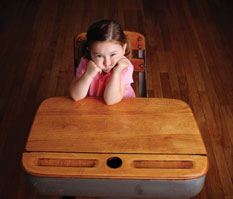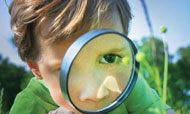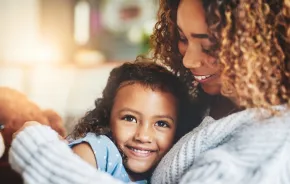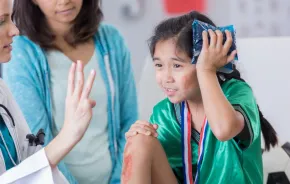 Seven-year-old Mary Dahl is fascinated by the lives of U.S. presidents — so much so that she spends her entire first-grade year studying them. While other kids her age are memorizing spelling words and practicing arithmetic and reading skills, Mary is learning all about the presidents, their wives, their families, geography — and when the first toilet was installed in the White House. Her teacher knows just how to keep her interest; Mary is her own teacher! Rather than receiving direct instruction, Mary is unschooled and initiates her own studies — with only a little help from her mom.
Seven-year-old Mary Dahl is fascinated by the lives of U.S. presidents — so much so that she spends her entire first-grade year studying them. While other kids her age are memorizing spelling words and practicing arithmetic and reading skills, Mary is learning all about the presidents, their wives, their families, geography — and when the first toilet was installed in the White House. Her teacher knows just how to keep her interest; Mary is her own teacher! Rather than receiving direct instruction, Mary is unschooled and initiates her own studies — with only a little help from her mom.
Welcome to the world of unschooling, homeschooling’s upstart younger sibling. Unschooling parents hope to preserve a child’s natural, internal urge to learn by letting them call the educational shots. It’s called “child-led learning,” and it’s one giant step removed from the usual curriculum-based learning at home that is homeschooling.
In unschooling, children select their own learning topics, which evolve and change throughout the year. Mary — now 8 — turned an early interest in presidents to a study of their lives, U.S. geography and politics, and even a few quirky facts (like that presidential potty!) along the way.
Unschooling is defined as a practice that welcomes exploration and experimentation, involves adults who act as models and facilitators, and is anchored in a deep trust that the child will learn, says Mary Griffith, author of The Unschooling Handbook: How to Use the Whole World as Your Child’s Classroom.
“Look at any healthy toddler,” Griffith says. “They live to learn, and it’s practically impossible to stop them from learning.”
Educator John Holt kicked off the unschooling revolution in the early 1980s with the books Teach Your Own and Learning All the Time. Today, Puget Sound−area families can choose from dozens of books on the subject and online groups that support their interests. There’s even a summer camp for unschoolers, the Not Back to School Camp, which offers sessions for teens in Oregon and Vermont.
No firm statistics on unschooling exist; unschoolers are usually lumped in with homeschoolers, whose estimated numbers range from 1.28 million to more than 2 million. But Seattle’s local unschooling email list has quickly grown to more than 100 families; some unschooling advocates estimate that as many as 20 percent of homeschoolers are unschoolers.
Unschooling for learning styles
Unschoolers know what you’re thinking: What if these kids never learn to read? What about friends? Isn’t this just educational neglect? How will they learn to do those tedious tasks to reach an end goal? Will knowing about the presidential toilet get you into college?
Seattle mom Melanie Kling says her family and friends were skeptical at first. Would her son Avery ever learn to read? To do math? Now 8 years old, he can do both easily, and Melanie’s fears are in retreat. Avery taught himself to read with a Leapster and some help from mom and dad; he now delves into mystery books. Avery takes an interest in multiplication and fractions, and creates arithmetic problems for himself.
For many families, unschooling simply fits their child’s learning style. Kling has positive memories of her own schooling, but found that the classroom wasn’t such a good fit for her introverted son, who passionately devoured topics for weeks at a time. Not everyone enjoys the quick topic-to-topic transitions often found in school. Avery listens to books on tape for hours, watches science videos, assembles puzzles and lists favorite words for spelling practice; he visits museums with his mom and other unschoolers and homeschoolers.
Unschooling parents are generally well educated and expose their children to a wide variety of resources and activities, from museums to international travel. It’s not education by neglect. Unschooling parents strew books on a diverse array of topics around the house, never knowing what an inquisitive mind might latch onto. Volcanoes? Immigration? Greek myths? Multiplication games?
And parents help unschooled kids take the information to the next level with “real world” exploration, such as visiting Mount St. Helens, mapping Greek legends onto the night sky or estimating how many glasses of lemonade the kids will need to sell to recoup their lemonade stand’s investment.
With unschooling, parental encouragement is balanced with an appreciation of the child’s intrinsic desire to learn, so that pushing and pressure don’t result. “Too far over the line, and you completely kill the interest,” Griffith says, because the child is no longer learning for himself.
But that doesn’t mean unschooled kids call all the shots. For example, Kling and her son take turns choosing daily activities. Many unschooled kids participate in classes, taking up everything from archery to zoo camps. Some kids work one on one with a mentor, expert or tutor to explore personal interests, or take classes from a homeschooling parent — if it suits the child’s interests.
“Unschooling shifts the responsibility of learning to the child,” Griffith says. “Learning is not done to someone. Learning is what one does. It’s an active process, as essential to life as breathing.”
 Unschooling for the hesitant
Unschooling for the hesitant
But just like all parents, unschooling parents worry. Are their kids learning enough? Will this fascination with maps or money or monkeys broaden and evolve?
“Literally everything can be learning,” Griffith says. Rather than assuming the negative — kids aren’t learning — unschoolers have faith that their child is gaining in some way from every experience.
And unschooling parents track the learning; the children take yearly assessments, as required by Washington state law for homeschoolers older than age 8. Kling keeps a scrapbook of her son’s activities, while Dahl is using resources from Columbia Virtual Academy, a publicly funded, parent-partnership program.
“I promised the grandparents that the girls would stay at least a year ahead of grade level, in case they want to return to school,” Dahl says.
But what about social skills? How will these kids gain the skills needed to interact in society? Unschoolers and homeschoolers often make the point that traditional schools hardly prepare kids socially for the “real world”; instead, schoolchildren develop cliquish, fashion-obsessed, stereotyping behaviors that must later be unlearned.
Kling’s son plays with kids his own age, chats with an elderly neighbor and visits a vendor they see weekly at the farmers market — they’ve even been out to visit his dairy. Seattle Homeschool Group’s email list offers daily outings for mixed-age groups, from homeschool swim classes to interpretive visits to the Washington Park Arboretum.
But unschooling doesn’t fit every family or learning style. Sara Cole of Seattle says that she tried unschooling her son Theo until he was 7, when she realized that they both needed more structure. “He thrives on rhythm and routine,” she says. “When he was in the free-floating model, he was bored.”
Today, Cole homeschools using a more established model, but she still tries to tie in Theo’s learning to fun topics he clicks with during their studies — like ninjas.
Long-term success?
For those who worry that children can’t know what’s best for them — and what’s best to learn — unschoolers advise patience. “We can’t know what knowledge will be most needed in the future,” Griffith says. “A subject learned late is often learned more easily and quickly than if pushed earlier, before the learner is interested.”
For example, Kling’s son wants to learn woodworking. He’s got the workbench, but also needs to learn how to estimate, measure and add — and he needs to learn patience. “If he wants to get somewhere, he also needs to learn what he needs to do to get there,” says Kling. “He wants the product, but he’s also learning the process.”
According to the unschooling philosophy, when kids want to achieve a goal — entry into an exclusive high school, admittance into Running Start or completing their application to an Ivy League college — they’ll learn what’s necessary, even if it’s a few years after everyone else.
Both of Griffith’s daughters went to college: One graduated from American Academy of Dramatic Arts in New York, while the other is studying kinesiology at Temple University in Philadelphia.
“It’s fun,” Griffith says of unschooling. “Of course, it’s a lot of work. The best learning is always a lot of work, but always feels like fun, because it’s what we want to be doing.”
Lora Shinn writes for a diverse mix of local and national publications, including ParentMap and Pregnancy. She’s not sure she could unschool her own kids — but she respects those who do.
Unschooling Resources:
Not Back to School Camp -- summer camp for unschooled children
Seattle Homeschool Group
Unschooling Books:
The Unschooling Handbook: How to Use the Whole World as Your Child’s Classroom, by Mary Griffith
The Unschooling Unmanual by Nanda Van Gestel
Learning all the Time by John Holt
Unschooling websites:
unschooling.com
Family Unschooler's Network
Growing Without Schooling
Jon's Unschooling Page
Life Learning magazine









